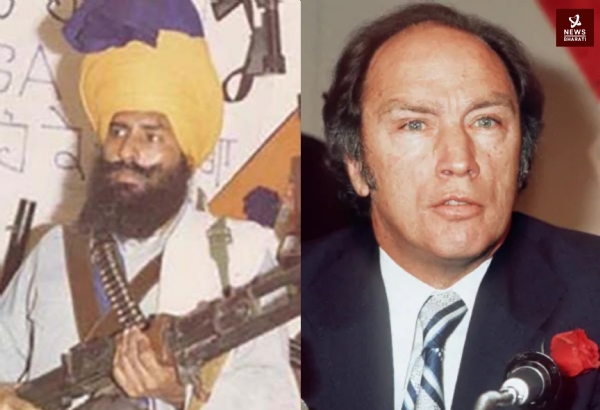Not the first 'Trudeau' to appease Khalistanis! All about the 'Talwinder Parmar' episode of 1982;
20 Sep 2023 12:03:56
Recently, during an emergency session of the parliament, Canadian Prime Minister Justin Trudeau claimed that his government had received 'credible allegations' linking Indian agents to the murder of Khalistani extremist Hardeep Singh Nijjar in British Columbia in June. Shortly after Trudeau's speech, Canadian Foreign Minister Mélanie Joly announced the expulsion of a senior Indian Diplomat based at the Indian High Commission in Ottawa.

Although, Indian government responded to the matter with a stern response, but it might be interesting to know that this act of Canadian Prime Minister thinking of appeasement politics in case Khalistanis is not happening for the first time. History has similar episode leading to a tragedy for Indians and interestingly there's another Trudeau in the story here.
Here's what had happened: In 1982, an extradition request was made by India for the Babbar Khalsa terrorist Talwinder Parmar in 1982. However, the Canadian government, that was then led by Pierre Trudeau , Father of Justin Trudeau , decided to not grant the request. And this had significant implications for both India and Canada.
Sikh militancy in Punjab escalated during the late 1970s and early 1980s, fueled by demands for greater autonomy and, in some cases, full independence from India. This period witnessed a rise in violent clashes between Sikh militants and Indian security forces.
Talwinder Parmar's Involvement:
Talwinder Parmar emerged as a prominent figure within the Babbar Khalsa and was allegedly involved in various acts of violence and terrorism in Punjab. His activities attracted the attention of Indian authorities, who sought to apprehend and prosecute him.
In 1982, India formally requested the extradition of Talwinder Parmar from Canada, where he had sought refuge. India provided evidence and information related to his involvement in terrorist activities. The request was made under the extradition treaty between India and Canada.
Canadian Response:
Although the Canadian government, led by Prime Minister Pierre Trudeau had an extradition treaty with India but they were dealing with growing Sikh communities in Canada, particularly in places like British Columbia, who were sympathetic to the Khalistan cause. There were concerns about how Parmar's extradition could impact Trudeau's appeasement politics policy in Canada.
Parmar's extradition case went through the Canadian legal system. It became a contentious issue, with Parmar's defense arguing that he would not receive a fair trial in India and that he could face torture or mistreatment. These arguments further delayed the extradition process.
In 1985, Pierre Trudeau's government decided not to extradite Talwinder Parmar to India. Ironically, the decision was based on concerns about the fairness of the trial in India and the possibility of torture. It was a significant and controversial move.
Now, 1985 is the same year when another tragedy took place. On June 23, 1985, the Air India Flight 182 was bombed by terrorists. This tragic incident resulted in the destruction of the aircraft and the loss of all 329 lives on board, making it one of the deadliest acts of aviation terrorism in history.
Connection to Khalistani Terrorism with the 1982 Air India bomb blast:
The bombing of Air India Flight 182 was carried out by individuals associated with Sikh militant groups advocating for Khalistan. The key figures involved in the plot were linked to Babbar Khalsa, one of the prominent Khalistani extremist organizations at the time. The primary individuals associated with the bombing included Talwinder Singh Parmar and Inderjit Singh Reyat.
Talwinder Parmar had sought refuge in Canada, where he continued to be involved in militant activities. Parmar is believed to have played a central role in planning the Air India bombing. Inderjit Singh Reyat was a Canadian resident of Indian origin who had ties to Sikh militant groups. He was responsible for constructing the bombs used in the Air India attack. Reyat had previously been involved in a related bombing at Narita Airport in Japan on the same day as the Air India bombing, which resulted in two deaths.
After the Air India Flight 182 bombing, a comprehensive investigation was launched to identify and apprehend those responsible. This investigation was a joint effort between Canadian law enforcement agencies, including the Royal Canadian Mounted Police (RCMP), and international partners, particularly Indian authorities. The legal proceedings related to the Air India bombing were complex and protracted. Reyat initially pleaded guilty to manslaughter charges in Canada but was later convicted of perjury for providing false testimony during the trial. Parmar was killed in 1992 in what was officially reported as a police encounter in India.
--
